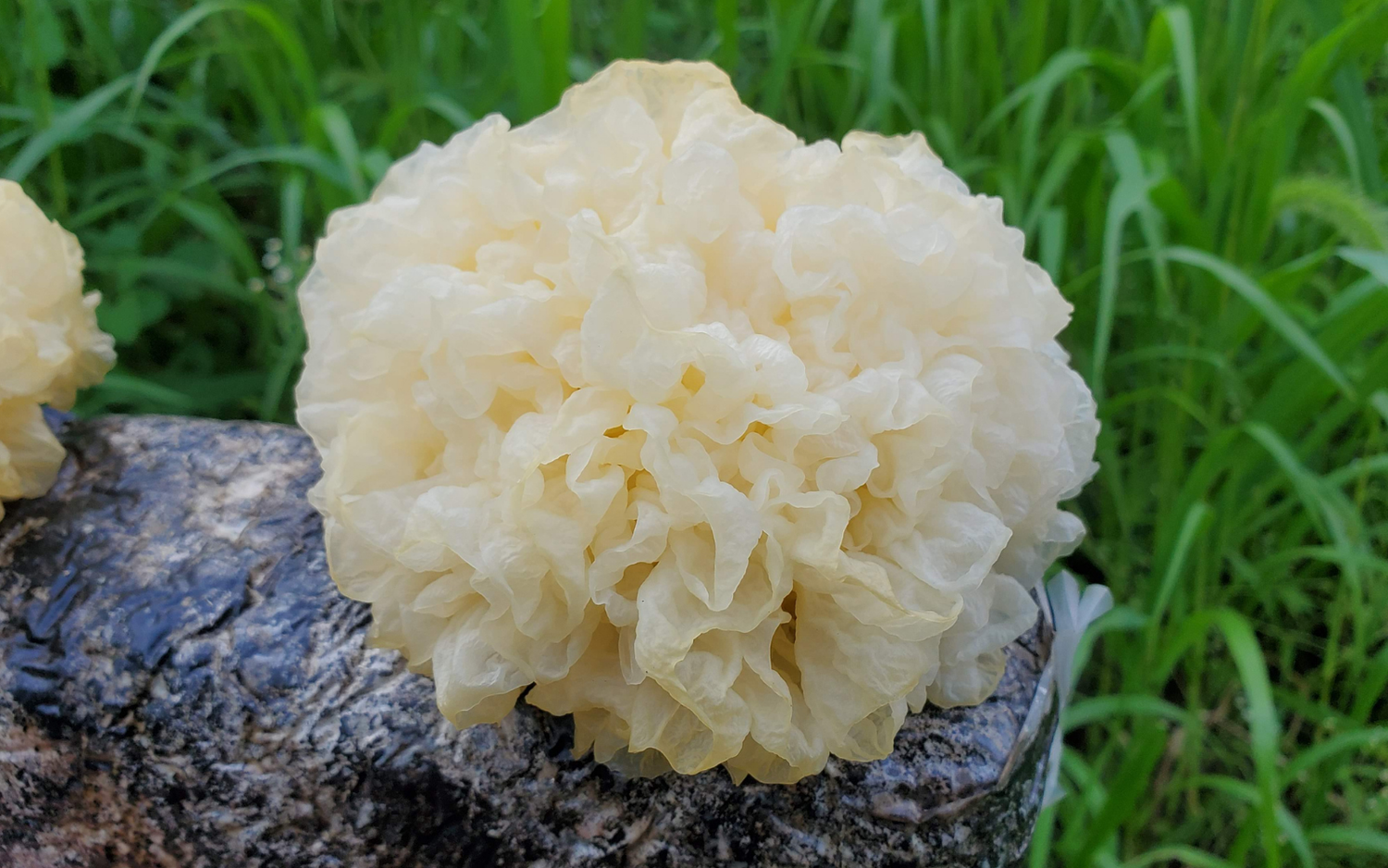For centuries, traditional Chinese medicine has used mushrooms as a way to treat countless ailments. But it's only in recent decades that Western culture and modern science are catching up with the many potential benefits of medicinal mushrooms.
While there is growing research on the many health benefits of mushrooms such as lion's mane, turkey tail, reishi, shiitake, maitake, and cordyceps, there is one mushroom in particular that has long been regarded as an ostensible fountain of youth: Tremella mushroom.
Read on to learn more about this phenomenal fungi and why its curative properties are more than skin deep.

What is Tremella Mushroom?
Its scientific name is Tremella fuciformis, but the striking "beauty mushroom" is more commonly known as tremella mushroom, snow mushroom, silver ear mushroom, snow fungus, or white jelly mushroom. Marked by white or yellowish jelly-like fruiting bodies that give it an appearance similar to a sea anemone, loofah, and jellyfish, this gelatinous fungus grows primarily in tropical regions on dead or fallen tree branches.History of Tremella Mushroom
In traditional Chinese medicine, tremella is believed to help boost the immune system, reduce inflammation, support lung function (particularly for conditions such as asthma and dry cough) and maintain clear, healthy skin. According to Chinese history, the use of snow mushroom as a fountain of youth goes back to the Tang Dynasty. Legend has it that during the eighth century, Yang Guifei—one of the Four Beauties of ancient China—relied on snow mushroom to maintain her glowing, youthful complexion. Such a beautiful woman was she that even the emperor could not resist her. Could this epic enchantment truly owe its power to jelly fungus? We might never know for certain, but the fact is that tremella mushroom can indeed offer some very real beauty benefits from the inside out.
Nutrition of Tremella Mushroom
Along with being a popular mushroom in centuries-old Chinese medicine, tremella mushroom has also been a common ingredient in Chinese cuisine.- One cup of tremella has 326 calories, less than one gram of fat, and more than 12 grams of protein.
- Tremella is extremely high in dietary fiber, offering 178% of the daily recommended intake.
- Tremella mushroom has high concentrations of vitamin D (essential for bone health), antioxidants, and minerals such as potassium.
Tremella Mushroom Benefits
Like other medicinal mushrooms, tremella is loaded with complex sugars (aka polysaccharides) including beta-glucans, which offer incredible immune support as well as anti-cancer and anti-tumor effects. (1) Take a look at some other health benefits linked to tremella mushroom.
A natural anti-aging agent
Tremella mushroom can enhance skin hydration thanks to its high levels of polysaccharides, which have been shown to have anti-aging properties and antioxidant effects that prevent cell damage by free radicals. (2) A report published in 2018 showed that tremella has excellent antioxidative and cell protective functions. (3)
Anti-inflammatory effects
Studies published in 2018 showed tremella fuciformis was able to inhibit the development and spread of inflammation and could therefore be a potential treatment for inflammation-related diseases including heart disease, obesity, and tumors. (4)
Can lower cholesterol
Because of its high fiber content, tremella has been linked to lowering triglyceride and LDL cholesterol levels and preventing heart disease. (5) Studies conducted on rats also show the positive effects tremella had on reducing cholesterol levels. (6)
Could combat obesity
Hand-in-hand with its anti-inflammatory and cholesterol-lowering properties, tremella mushroom has been shown to prevent weight gain in rodent studies. (5) While results are promising, further research is needed to determine if tremella could be a viable treatment for obesity.
Protects and regenerates nerve cells
Research conducted with hot water extract of tremella fuciformis has shown that it has strong neuroprotective effects. What's more, tremella appears to have nerve growth factor (NGF), which could induce the growth of new nervous tissue. These results suggest that tremella could potentially be used as a treatment for neurodegenerative diseases such as Alzheimer's. (7)
Can kill cancer cells
In a 2018 study conducted in China, researchers found that tremella was able to fight lung cancer cells as well as offer a protective role in lung injury. (8)
Tremella Mushroom Skincare
No longer a beauty secret of Chinese women and Japanese women, snow mushroom is well on its way to becoming a global sensation. Because of its high antioxidant, anti-inflammatory, and ultra-hydrating properties, it's no wonder snow mushroom is becoming a more popular ingredient in skincare products. Today, you can find it in everything from moisturizers to face masks from high-end natural beauty brands such as Tata Harper, Moon Juice, and Kypris.
Tremella Mushroom vs Hyaluronic Acid
If you know anything about skincare, you know that hyaluronic acid (HA) is the gold standard when it comes to hydration. Hyaluronic acid is a key molecule in skin aging with a unique capacity to bind and retain water molecules. (9) It's said to hold up to 1,000 times its weight in water and it's what keeps us hydrated from the inside out. Tremella behaves much like hyaluronic acid by pulling moisture to the skin, which in turn improves elasticity and can give a more youthful appearance. Unfortunately, the natural aging process—along with diet, stress, and environment—can dramatically decrease the production of HA in the body. However, the good news is that tremella mushrooms might be able to help "fill in the blanks" when it comes to improving skin tone, texture, and elasticity. The consensus among many dermatologists is that the gelatinous molecules of tremella are smaller than hyaluronic acid, making it easier to penetrate the skin as well as providing more water holding capacity. Plus, unlike hyaluronic acid, tremella offers a host of other beneficial properties (as mentioned above) that can boost overall health.How To Use Tremella
There are many ways to take tremella mushroom, from using it on the skin to consuming it as a food. Because fresh, whole tremella mushrooms are not easily available outside of Asian countries, here are some convenient ways to use this nutrient-dense fungi.Skincare Products
Chances are it's going to become easier and easier to find tremella in skincare products, especially those offering anti-aging benefits. Look for natural products that are free from synthetic chemicals, parabens, phthalates, sulfates, and other questionable ingredients that can worsen dry skin or cause irritation.Tremella Mushroom Powder
Probably the most common and convenient way to find tremella mushroom is in a finely ground powder. Thanks to its mild, subtly sweet flavor profile, it's easy to add tremella mushroom powder to smoothies, acai bowls, parfaits, yogurt, even tea.Tremella Mushroom Extract
You can find liquid tremella mushroom extract that can be squeezed into water, drinks, or food. Only buy from reputable brands and start small—consider starting with just 1/4 tsp for a week before increasing dosage if necessary and pay attention to how your body feels.Side Effects of Tremella Mushroom
Tremella is considered safe to use and there are no serious side effects that have been identified. That said, you should always consult your physician before taking any supplement, especially if you are pregnant, nursing, or have pre-existing health conditions.




